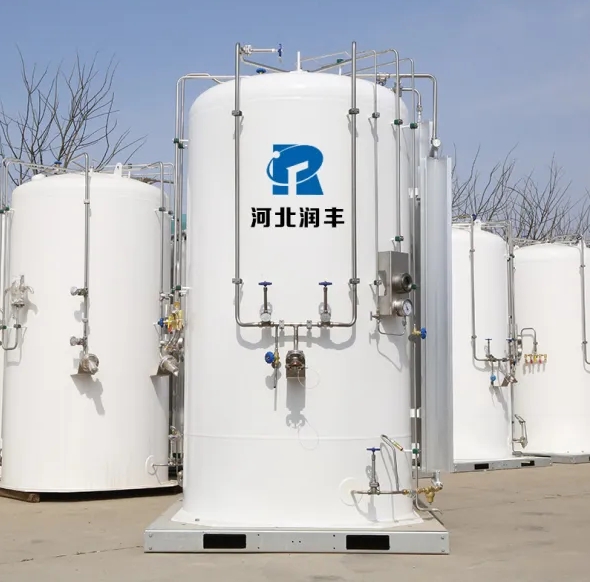What are the advantages of using a microbulk tank?
Microbulk tanks have emerged as a popular and efficient solution for the storage and transportation of liquefied gases in various industries. These versatile storage vessels offer numerous advantages over traditional high-pressure cylinders, making them a preferred choice for small to medium gas consumption requirements. In this article, we will explore the key advantages of using a microbulk tank and how they contribute to cost savings, operational efficiency, and enhanced safety.
1. Cost Efficiency:
One of the significant advantages of utilizing a microbulk tank is its cost efficiency. Compared to high-pressure cylinders, microbulk tanks eliminate the need for individual cylinder purchases, cylinder rental fees, and the associated administrative costs. Instead, a single microbulk tank can store a large volume of liquefied gas, reducing the frequency of refills and decreasing labor costs.
Furthermore, microbulk tanks are designed to minimize gas losses. With their integrated pressure-building equipment and pressure regulation systems, these tanks efficiently control the gas flow, preventing wastage and optimizing utilization. By reducing gas losses and streamlining the procurement process, businesses can achieve significant cost savings over time.
2. Space-saving:
In industries where space is a constraint, microbulk tanks offer a valuable advantage. These tanks have a compact footprint, requiring significantly less floor space compared to a bank of individual high-pressure cylinders. The space-saving design of microbulk tanks allows for efficient utilization of the available area, making them suitable for facilities with limited storage capacities.
By consolidating gas storage into a single tank, businesses can free up valuable space for other equipment or processes. This optimization of space not only improves overall operational efficiency but also provides more flexibility in facility layout and design.
3. Continuous Gas Supply:
Maintaining a consistent and uninterrupted gas supply is crucial for many industrial processes. Microbulk tanks are equipped with automatic filling systems that ensure a continuous supply of liquefied gases. These systems monitor the gas levels within the tank and automatically initiate refilling when the gas volume falls below a specified threshold.
By eliminating the need for manual intervention and constant monitoring, microbulk tanks provide a reliable and uninterrupted gas supply. This feature is particularly beneficial for industries where a sudden interruption in gas availability can result in production delays, compromised quality, or operational inefficiencies.
4. Reduced Handling and Transportation:
Traditional high-pressure cylinders require frequent handling, transportation, and replacement, which can be labor-intensive and time-consuming. Microbulk tanks mitigate these challenges by reducing the number of cylinder changes and the associated handling and transportation requirements.
With microbulk tanks, gas is delivered directly to the facility and stored in a single vessel. This eliminates the need for frequent cylinder swaps and minimizes the risk of accidents or injuries associated with manual handling. Moreover, the reduced transportation needs result in lower fuel costs and decreased environmental impact.
5. Safety Features:
Microbulk tanks prioritize safety and incorporate several features to ensure secure gas storage and handling. These safety features include:
Pressure relief valves: Microbulk tanks are equipped with pressure relief valves that prevent over-pressurization by venting excess pressure.
Vacuum insulation: The double-wall design of microbulk tanks includes a vacuum jacket that provides superior thermal insulation, minimizing heat transfer and maintaining low temperatures within the tank.
Alarm systems: Tanks are equipped with audible and visual alarms that alert operators in the event of high pressure, low-level conditions, or other safety concerns.
Remote monitoring: Some microbulk tanks offer remote monitoring capabilities, enabling real-time tracking of pressure, temperature, and other critical parameters. This allows for proactive maintenance and immediate response to any anomalies.
Compliance with industry standards: Microbulk tanks adhere to strict safety standards and regulations, ensuring that they meet the necessary certifications and codes for safe operation.
Overall, the advantagesof using a microbulk tank for gas storage are significant. They offer cost efficiency, space-saving capabilities, continuous gas supply, reduced handling and transportation requirements, and enhanced safety features. These advantages make microbulk tanks a preferred choice for industries that rely on a reliable and efficient gas supply.
By streamlining gas storage and optimizing utilization, businesses can achieve substantial cost savings over time. The elimination of individual cylinders and the reduction of gas losses contribute to lower operational expenses and improved financial efficiency. Additionally, the space-saving design of microbulk tanks allows for better space utilization, providing flexibility in facility layout and design.
The continuous gas supply offered by microbulk tanks ensures uninterrupted operations and eliminates the risk of production delays. The automatic filling systems monitor gas levels and initiate refilling as needed, eliminating the need for manual monitoring and intervention. This feature is especially crucial in industries where a consistent gas supply is vital for uninterrupted processes.
Microbulk tanks also reduce the handling and transportation requirements associated with high-pressure cylinders. With fewer cylinder changes and decreased manual handling, the risk of accidents or injuries is minimized. Furthermore, the reduced transportation needs result in lower fuel costs and a reduced environmental footprint.
Safety is a top priority in the design of microbulk tanks. They are equipped with pressure relief valves, vacuum insulation, and alarm systems to ensure safe operation. Some tanks also offer remote monitoring capabilities, enabling real-time tracking of critical parameters. Compliance with industry standards and regulations ensures that microbulk tanks meet the necessary safety certifications and codes.
In conclusion, the advantages of using a microbulk tank for gas storage are manifold. From cost savings and space efficiency to continuous gas supply and enhanced safety features, microbulk tanks offer a reliable and efficient solution for various industries. By embracing this innovative storage technology, businesses can optimize their operations, reduce costs, and ensure a seamless gas supply for their processes.
325
0
0


Comments
All Comments (0)